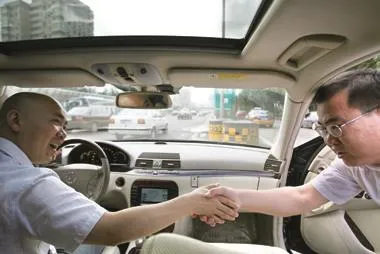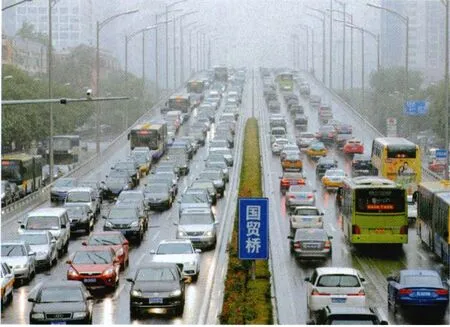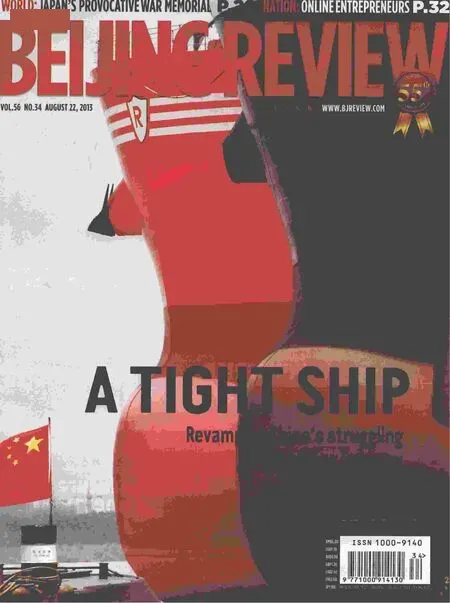Trying a New Way Beijing NGO launches a charity program to encourage carpooling
2013-12-07ByWangHairong
By Wang Hairong

KIND OFFER: A passenger says goodbye to Wang Yong (left), a vocal carpooling advocate after taking a free ride with him in Beijing
Huilongguan, a large residential area on Beijing’s northern outskirts, is home to approximately 400,000 people, many of whom travel more than 12 km every day to work in the city’s downtown area.
Morning commuters squeeze into buses already at capacity. Subway cars are so crowded that riders can barely turn around. And private car owners have to contend with traffic congestion on the Badaling Highway.
Wang Yong, founder of the Shunfengche Charity Foundation (Shunfeng means “free ride”in Chinese), decided to change the situation by introducing carpooling to the community.
The foundation piloted carpooling in the Huilongguan area from June 17 to July 16.Now the program has been extended until September 20. Private car owners who provide rides to more than two passengers during the 7-9 a.m. rush hour period get their 5-yuan($0.82) highway toll paid by the foundation.
Volunteers have been recruited to promote the program to car owners. They were also stationed at Huilongguan and nearby Xisanqi entrances to the Badaling Highway to issue toll vouchers for those carrying at least two passengers. Ten huge billboards have been erected along the highway to advertise the campaign.
Good intentions
“We launched the program to conserve energy,alleviate traffic pressure and enhance trust between people,” said Wang Chenfei, a program officer.
Before the program started, staff of the Shunfengche Foundation spent one week studying car ridership in the Huilongguan area during the morning rush hours. Their data show that from 7-9 a.m. every day, 85 percent of the cars driving out of the area had only the driver on board, about 13-14 percent of cars carried two persons,and only about 1-2 percent of the cars carried three or more persons.
Beijing is home to more than 5 million private cars, and every day 1 million of them are kept off the road by the city’s policy to restrict car use based on the last digit of cars’ plate numbers. The foundation estimated that carpooling can take an additional 400,000 cars off the road, thus reducing road traffic by 10-25 percent.
Given that a car consumes an average of 8.06 liters of gasoline per 100 km, and assuming that every car travels 20 km daily, the foundation calculated that carpooling can reduce gasoline consumption in Beijing by 464 tons on a daily basis. In the meantime, a significant amount of air pollution will be cut accordingly.
In addition to environmental concerns, Wang Yong believes that giving people rides can foster goodwill between people. He said that he was inspired to initiate the carpooling program by a man he knew since childhood who happily gave fellow villagers a lift into town. The man was highly respected for doing so.
Wang Yong himself has been offering rides to others since 1998. In the beginning, his offers were often turned down. “People usually responded with indifference, suspicion and even hostility,” he said.
After the media reported his story, Wang Yong was gradually accepted by others as a kind-hearted man offering free rides in his Mercedes-Benz. Over the past 15 years, he has given rides to more than 10,000 people, Wang Yong said.
Before setting up the Shunfengche Foundation in January to promote carpooling,Wang Yong already launched a well-known carpooling initiative in 2011 during the Chinese New Year peak travel season, together with celebrities such as Deng Fei, initiator of a popular“free lunch” campaign to improve childhood nutrition.
That year, the carpooling initiative attracted 18,000 people who either needed a ride (usually long-distance) back to their hometowns for family reunions during the traditional festival or who would like to give rides to others.Eventually, 500 drivers gave long-distance rides to more than 1,000 passengers.
During the 2013 Chinese New Year holiday,Wang’s carpooling initiative again drew 402,429 applicants, and 9,678 of them eventually drove others or were given a ride.
But Wang Yong does not want to stop there. At the end of May, he convinced the Beijing Municipal Government to greenlight the pilot implementation of a regular carpooling program in the Huilongguan area.
Before the official launch of the program on June 17, 13,000 leaflets were inserted into newspapers and distributed in the Huilongguan area.
On that day, volunteers prepared 300 highway toll vouchers, yet only 14 were claimed and used by eligible carpoolers.
The situation improved remarkably on the third day, when some private car owners stopped to inquire about how to participate in the program, Liu said.
Hu Dan is one of the passengers that got a ride through the program. She has made an arrangement with some drivers to ride in their cars to work for four days a week.
“Carpooling can save me the trouble of squeezing onto crowded buses. It is time-saving and comfortable,” Han said.
Data from the Shunfengche Foundation show that in the first month that the program was implemented, it paid highway tolls for 1,645 cars carrying a total of 4,935 persons. That translates into about 75 cars and 224 persons per weekday. The numbers are quite modest in light of the large number of residents in the area.

CONGESTION:Heavy traffic clogs Beijing’s East Third Ring Road on July 15
Obstacles
Currently, the biggest difficulty in promoting carpooling is lack of policy support and public participation, said Wang Yong, adding that many people worry about their personal safety when riding with strangers.
In addition to lack of social trust, accident liability also holds drivers back from sharing their vehicles. According to China’s Tort Law and the Supreme People’s Court’s interpretation of laws related to damage compensation for traffic accidents, a passenger is usually not liable for damage caused by driver’s error.
Nonetheless, Dong Laichao, founder of Beijingjtlawyer.com, an Internet portal on traffic laws, said that if a passenger was hurt in a traffic accident and the driver is found to be at fault,the driver has to compensate the passenger even if the ride was free.
The Shunfengche Foundation has prepared a carpooling agreement for drivers and passengers, which has clearly specified liability in case of traffic accidents according to relevant laws and regulations. The agreement states that if the driver has no fault in traffic accident,he or she is not liable for the passengers’ loss,whereas if the driver has fault, he or she is liable for the damage he or she has incurred to the passengers.
Besides liability concerns, drivers participating in carpooling are concerned that they might be punished for operating an unlicensed taxi if they share costs with passengers.
In China, vehicles are classified into operating vehicles and non-operating vehicles. Nonoperating vehicles are prohibited from engaging in for-profit activities.
“Unlicensed taxis cannot operate under the name of carpooling,” said a Beijing traffic law enforcement officer who only disclosed his surname as Xiao.
Xiao said that previously, if a driver discussed payment for a ride with any passenger,the driver will be deemed as operating an unlicensed taxi service. However, he said that now law enforcement officers have become more flexible, and if the driver only charges passengers the cost of a ride, he will not be punished.
Dong suggested that the government should regulate carpooling and build a platform to overcome the information asymmetry between drivers and passengers.
The Beijing Municipal Government plans to release a guideline on carpooling at the end of this year, reported Beijing Times on August 5.The regulation is expected to encourage carpooling and a reasonable split of carpooling costs.
“Carpooling regulations should be detailed.For instance, it should specify how drivers and passengers should split gasoline costs,” said Qiu Baochang, head of the legal team of the China Consumers’ Association. ■
杂志排行
Beijing Review的其它文章
- promoting Trade Foreign trade can play a bigger role in ensuring stable economic growth
- Mind Your Own e-Business! More job hunters start business careers on the Internet
- Seeking a Cure Cities are upgrading drainage systems to battle chronic flooding
- ABANDON SHIp ? NOT SO FAST China is set to revitalize its beleaguered shipbuilding sector?
- Who Wants to Be Number Two?Imagining a future beyond the superpower paradigm
- A Needed Reform Interest rates must be fully liberalized to meet the demands of the market
